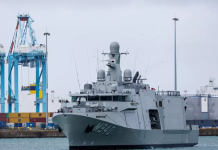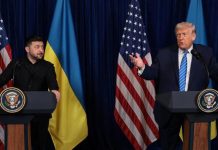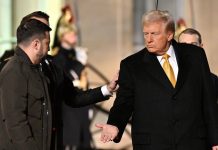Adam Siemienczyk:Creating a national identity requires constant work. How is its development influenced by transcontinental exchange?
 Marat Ahmedjanov:As for me, this type of exchange develops every nation and culture, giving an unique opportunity to learn how to create an identity and consciousness through the positive and effective experience of other countries. For example, the UK is not only the world culture treasury but one of the countries with the most effective system of national idea and identity PR programme. And this experience has played throughout thousands of years of history.
Marat Ahmedjanov:As for me, this type of exchange develops every nation and culture, giving an unique opportunity to learn how to create an identity and consciousness through the positive and effective experience of other countries. For example, the UK is not only the world culture treasury but one of the countries with the most effective system of national idea and identity PR programme. And this experience has played throughout thousands of years of history.
AS:Can the poetry be translated?
MA:Depends on what we mean by “translation”. If we’re talking about a thorough and deep translation of senses, themes, shades and imagery that makes up the “national soul” then I should be honest – it’s impossible. Not because of some technique of translating but because of the very different attitudes of different cultures and nations, limited by their own cultural and life perception on the world. But the secret is that it’s not necessary to try to deliver all of the nuances of national poetry. It’s like a national uzbek plov – the traditional dish for any celebration. It’s quite difficult to teach an Englishman to cook it as any Uzbek does. And it’s not necessary because we have very different lifestyles in the UK. What is most important is to make a proper adaptation of it to make it a pleasant and organic part of the English culture the same as Indian food. The same is for poetry – we try to make it adaptable for the audience, but still keeping the main idea of a poem.
should be honest – it’s impossible. Not because of some technique of translating but because of the very different attitudes of different cultures and nations, limited by their own cultural and life perception on the world. But the secret is that it’s not necessary to try to deliver all of the nuances of national poetry. It’s like a national uzbek plov – the traditional dish for any celebration. It’s quite difficult to teach an Englishman to cook it as any Uzbek does. And it’s not necessary because we have very different lifestyles in the UK. What is most important is to make a proper adaptation of it to make it a pleasant and organic part of the English culture the same as Indian food. The same is for poetry – we try to make it adaptable for the audience, but still keeping the main idea of a poem.
AS:London is a place where different cultures can meet. Is it somehow a unique place?
MA:Yes, of course. London is a unique place turned into the bridge between the Old World and the New World attitudes, whilst still being one of the world’s biggest transit hubs and education capitals. Besides the positive effect of some conservatism and the fact that nobody conquered the country during the last thousand years, London became the best Treasury of world culture. And because of the welcome-to-everyone lifestyle of the port city London is always open to everything new. There is no city like that on the Earth.
AS:Is there an invisible thread of understanding between artists from different cultures?
MA:Sure. An artist is always an artist no matter where they’re from. First of all, it’s a very sophisticated perception of life to be an artist. The very strong drive to self-expression is the second main common thing for each and every artist I know. And the third thing which is almostly “out of reality” for “normal” people in comparison with individuals dedicated their lives to arts and culture is the priority of self-expression in art before money and other material values. History knows a lot of geniuses who died in poverty but didn’t betray their mission. I think, everyone passes through some “artistic” period in different stages of his life, but not everyone is brave enough to take this risk.

AS:What does emigration mean to you?
MA:For me personally it’s a freedom first of all. Freedom to decide where and when I want to be, and who is with me. I think that the right to travel and emigrate should be essential, same as freedom to speak, to choose a religion and other.
AS:What are you working on now? Where can you be seen?
MA:It’s a very good question. In the near future I will publish two collections. One is the short prose collection called “The Thread” which will see the 6th edition and this year it’s dedicated to the platinum anniversary of the reign of Queen Elizabeth II. The second one is the unique poetic Almanac “Voices of Friends: Poetry & Art -2023” – the treasury of Eurasian poetry. I also work on the Eurasian Creative Week on 1st-7th of October in Australia and our 11th Open Eurasian Literary Festival & Book Forum on 25th-28th of November in London. All these projects unite creative people of the world and empathise with Eurasian culture.
AS:What’s your message to the world?
MA:Be brave enough to be a creative person and do your best to leave your mark in history. I think thats the most important thing.
BIOGRAPHY!
Mark Akhmed (Marat Akhmedzhanov)
Mark was born in 1976 in Jizak, Uzbekistan. His mother is a Christian Ukrainian and his father is a Muslim Tatar. After Uzbekistan’s independence in 1991, Mark became chairman of the Jizak Youth Union, the successor to the Soviet Komsomol, and began learning English. With many partners, Mark founded Uzbekistan’s first modelling agency, organised the first Uzbek international fashion week, founded an advertising agency, and published a fashion/lifestyle magazine in Uzbekistan. After working briefly for an American travel magazine, he earned a graduate degree in publishing as part of a Chevening Fellowship from the UK Foreign and Commonwealth Office at the University of the Arts in London.
Mark aims to promote Eurasia’s culture in the English-speaking space. He founded Silk Road Media and Hertfordshire Press to introduce new perspectives on modern society, art, history, tradition in English to global audiences. The first book forum “Open Eurasia,” first organised by Mark’s team in Bishkek in 2012, continues to this day. Despite being based in London, Mark travels frequently in Eurasia, where, in collaboration with many partners, he organised events in Stockholm, Kazan, Moscow, Minsk, Dushanbe, Simferopol, Tashkent, Almaty and other cities around the world. Mark (Marat) Akhmedzhanov is not only the founder of the bilingual publishing house Silk Road Media and Hertfordshire Press, but also the vice-chairman of the Eurasian Creative Guild (London).









